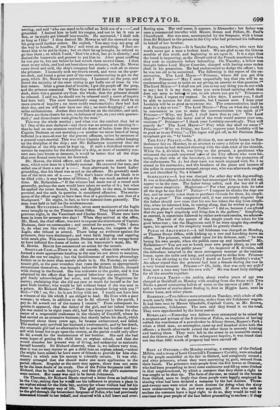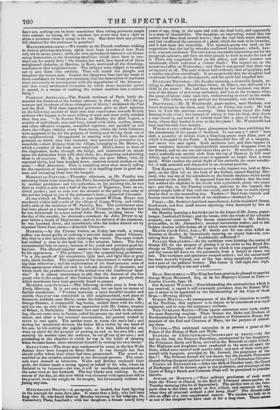have not, nothing can be more. scandalous than taking prisoners
people svho commit no wrong, for by common law every man has a right to abate a nuisance when it comes in his way. Has there been any private bill obtained for the enclosure in question ?
MACHINE-BREAKERS.—We wonder at the French workmen wishing to destroy printing-machines, w‘hich have been introdueul into Paris only six or seven years ; while our own agriculturallabourers are threat- ening destruction-to the thrashing-machines which have been in con- stant use for nearly forty ! On Sunday last week, four hundred of these enlightened clodpoles at Hardres, in Kent, destroyed all the thrashing machines in that neighbourhood. The military were obliged to be called out to awe them into sobriety. They will attack the ploughs and slaughter the horses neat. Cannot the clergymen beat into the heads of these candidates for brute pre-eminence,•that the destruction of machines must necessarily be accompanied with the degradation of the labourer ; and that every mechanical invention by which more muscular power is spared, is a means of exalting the animal machine into a rational being ?
FOREIGN ARTISANS.—The French workmen of Paris lately de- manded the dismissal of the foreign artisans in that city. Oh [the ig- norance and insolence of these champions of liberty ! exclaimed the Post and the Bull. Will these impartial gentlemen give us their opinions on the following account of their own dear countrymen towards British artisans who* happen to be more willing to work and more easily satisfied than they are. "At Burton Pidsea, on Monday the 23rd August, a number of individuals, men and boys, armed with clubs, scythes' stones, and other offensive weapons, assembled together, and paraded up and down the village, visiting every farm-house, where the Irish labourers were supposed to be, for the purpose of beating and driving them out of the neighbourhood. Disappointed in meeting with the Irish upon the premises on which they . had intruded, they marched in procession to' a corn-field, a short distance from the village belonging to Mr. Baxter, in which a number of the Irish were employed. Half-a-dozen or more of the ringleaders, broke through the hedge, and commenced an attack upon the defenceless Irish with their clubs, &c., dispersing and pursiling them in all quarters.. Mr. B., in defending one poor fellow, who, by repeated blows, had been knocked down, received several strokes on the arms."—Hull Advertiser. This is something more than merely calling for the expulsion of foreign workmen : itis expelling them in good ear- nest, and outraging them into the bargain.
HIBERNIAN PasrimE.—Thursday afternoon, as Mr. Purefoy was returning home from attending the Petty Sessions at Tipperary, attended
by another gentleman and two policemen, on his jaunting car,Ie was fired at Within a mile and a half of the town of Tipperary, from an en. closed garden and so near was the assassin to the party that some of
the powder lodged in one of the policemen's faces.—Limerick Chronicle.
At one o'clock on Tuesday last, a man named William Dwyer was murdered within half a mile of the village of Cappa-White, and within
half a mile of the residence of W. Purefoy, Esq. The unfortunate man had been placed as a keeper on the lands of Crossoyle ; On Saturday last lie was threatened by a man named john Dwyer, residing there. On the day of the murder, he obtained a summons for John Dwyer to ap-
pear before a bench of Magistrates; and on his delivery. of the summons,he was knocked down, and immediately after hie brews dashed out by repeated blows from stones.—Limerick Chronicle.
Mum:Init.—At the Chester Assizes, on Friday last week, a young :ruffian was found guilty of stabbing a married female named Chesters. She died in a few minutes after receiving the wound. The. same wretch had stabbed a man in the back but a few minutes before. The Jury recommended him to mercy, because of his youth and previous good be- haviour. The Herald reporter seems to have been mightily captivated bv his appearance. "The prisoner," says the sympathizing gentleman, "'is a fine youth, of fair complexion, light hair, and light blue or gray eyes much sunken. The expression of his Countenance is rather pleas- ing than otherwise and the conforination of his head presents none of those appearances which are said to indicate ferocity of character, nor which mark the predominance of the animal over the intellectual facul- ties." It is almost unnecessary to add, that the features of the fine youth who is the subject of this Cockney laudation are precisely those which murderers have been generally found to possess. MURDER AND Surcinn.—The following terrible story is from the Derby Mercury. It is not very clearly told, but we have no means.of farther elucidation. "Tuesday morning, a more dreadful murder and suicide than ever was committed in this neighbourhood, took place at Sutton-in-Ashfield, near Derby, under the following circumstances. Mr. George Shooter, a respectable bag hosier, resided there with his wife; and his son, an only child, was an apprentice with Mr. Lomas, surgeon of Belper, in Derbyshire. Between two and three o'clock in the morn- ing, the son came over to Sutton, called his parents up, and took refresh- ments, and after' a few minutes' conversation, his parents wished to retire to rest again. The mother went to warm the son's bed ; and during her temporary absence, the father fell a victim by the hand of his son, by his cutting the jugular vein. It is then believed the son went up stairs for the purpose of putting an end to his own life ; and meeting his mother upon the staircase, he cut of one of her ears ; and proceeding to the chamber in which he was in the habit of sleeping When he came home, there destroyed himself, by cutting his own throat."
ExEcurtow.—The three men condemned for arson at the late Wells Assizes have been hanged on Kenn Moor. It was thought but that should suffer where their 6rinae had been perpetrated. The crowd as- sembled on the occasion amounted to ten thousand persons. The crimi- nals were dressed as labourers. Wales and Rowley confessed their guilt, the former made a strong appeal on behalf of his wife, whom he declared to be innocent—she was, it will be recollected, condemned at the same time as her husband. The boy Clarke said nothing. In the course of the day, an elm-tree which was clustered with spectators fell to the ground, from the weight on its boughs, but fortunately without in- juring any one.



























 Previous page
Previous page